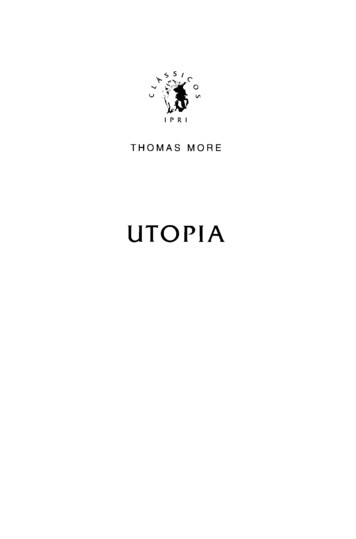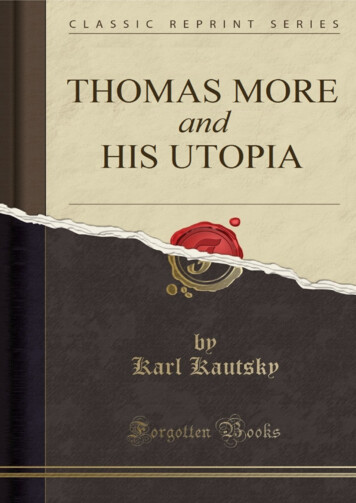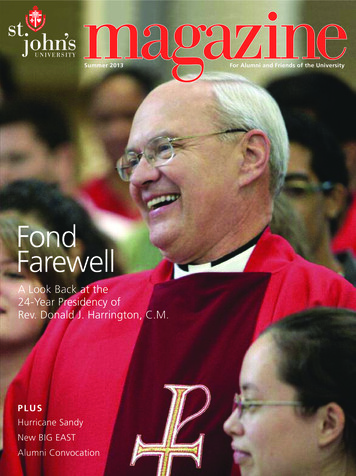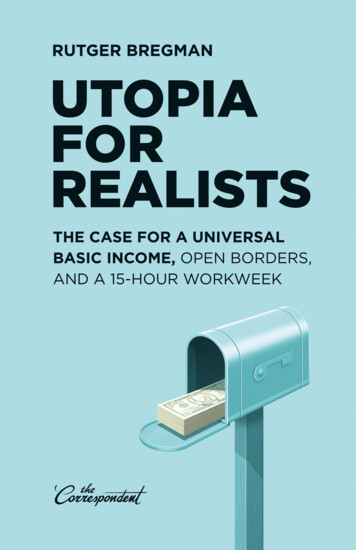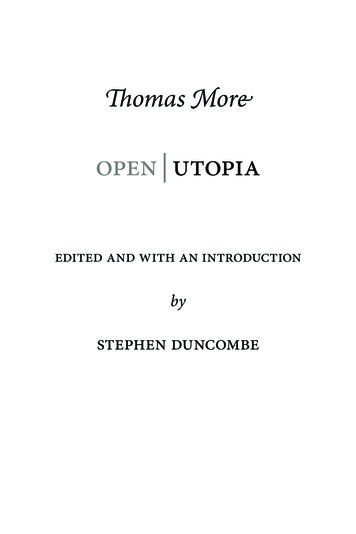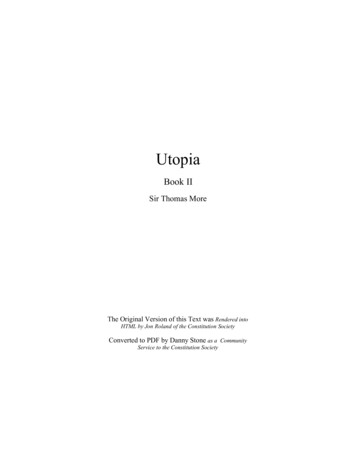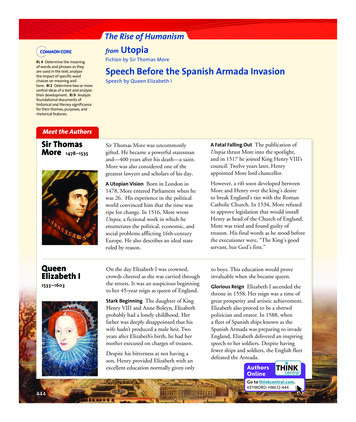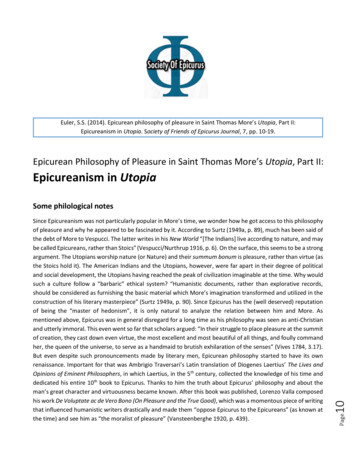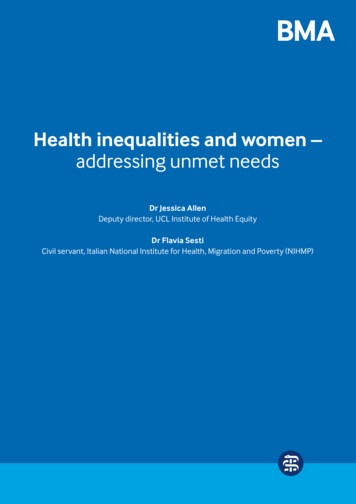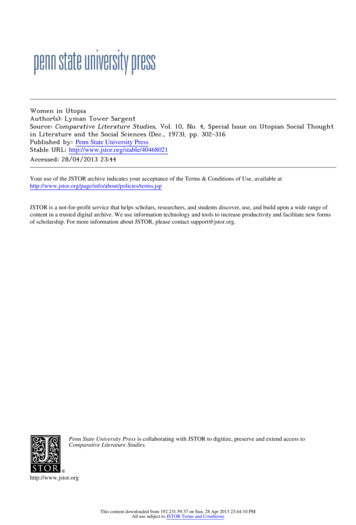
Transcription
Women in UtopiaAuthor(s): Lyman Tower SargentSource: Comparative Literature Studies, Vol. 10, No. 4, Special Issue on Utopian Social Thoughtin Literature and the Social Sciences (Dec., 1973), pp. 302-316Published by: Penn State University PressStable URL: http://www.jstor.org/stable/40468021 .Accessed: 28/04/2013 23:44Your use of the JSTOR archive indicates your acceptance of the Terms & Conditions of Use, available at ms.jsp.JSTOR is a not-for-profit service that helps scholars, researchers, and students discover, use, and build upon a wide range ofcontent in a trusted digital archive. We use information technology and tools to increase productivity and facilitate new formsof scholarship. For more information about JSTOR, please contact support@jstor.org.Penn State University Press is collaborating with JSTOR to digitize, preserve and extend access toComparative Literature Studies.http://www.jstor.orgThis content downloaded from 192.231.59.37 on Sun, 28 Apr 2013 23:44:10 PMAll use subject to JSTOR Terms and Conditions
Womenin UtopiaLYMAN TOWER SARGENTABSTRACTaremovementThe positiveutopia,or societies,futuresviewsof desirableincludingand makeand statusof amilyand makewomenfairlyequal (PlatoandCampanella)or maintaininferiorwomendefinitely(Moreand Baconand mostutopiassince1850). qual,butin mostThe negativeothercommunesutopia,or indicatingtopia,oftenshowswomenas equal,therebynotbringaboutthegood society.(LTS)utopiasifyou wish,isStudyingpast imagesof desirablefutures,because of whatit tellsus about howalmostalwaysinstructivepeople havefeltthe lifeof theirtimecould be improved;it is parto takea questionthatis exercisingus today,ticularlyinterestingsuchas theroleand statusof women,and see how otherswouldhavechangedthatposition.Whilewe cannotlook at all suchutopias, yand we can examinesomeof thosethatdid makesuggestions.In theseworkswe are giventhe (usuallymale) authors'viewsofthebestor significantlybettersociety,and alongwiththese,theirviewsof whatrolesand statuswomenshouldhavein a good sociof thebestety.Hence we are oftengivenverydirectdescriptionsselectionroleand statusforwomen.I have takena representativeof theseviewsand ncetheirmeaningsare usuallyobvious.It would takea lengthymonographto do a completejob of relatingthe attitudesof theutopiasthatdeal withthisquestionto the timeinwhichtheutopiasthemselveswerewrittenor of comparingthetoeachandthatis simplynot possiblehere.other,utopiasIn additionto the positiveutopia,or eutopia,I haveexamined,muchmorebriefly,two otherformsof utopianism,the302This content downloaded from 192.231.59.37 on Sun, 28 Apr 2013 23:44:10 PMAll use subject to JSTOR Terms and Conditions
WOMEN IN UTOPIA303and thedystopia,or "bad place,"1 owardwomen.In the case of the comI havelimitedmysurveyto thoseestablishedin themunities,becausethesedata areUnitedStates.Thiswas done lse but also bein the atesthananywhereelse.In each exampleI havepresentedonlythoseaspectsof the workor communitythatdeal directlywiththepositionof women.Ihavenot attemptedto presenta pictureof the entiresocietyexof theceptwhereit seemedessentialto givean understandingstatusof womenin thatsociety.Withineach category,I haveproceededchronologically.EutopiasLeavingaside forthe presentthequestionof whetheror notPlato'sRepublicshouldbe classifiedas a utopia,it providesa goodplace to start.Plato arguesthatwomenshouldbe treatedas fullyAndequal, "exceptthatwe treatthemas not quite so strong."2he carriesout thiscontentionfairlyconsistentlyby discussingthemin the sametermsas he does men.Womenshouldbe equalwithmenin all branchesof lifeand shouldbe treatedinpartnerstheexactly sameway. His famousabolitionof thefamilyand hisproposalof controlledsexualrelationsfortheGuardiansare partof hismeansof ensuringequality,eventhoughtheprimarypurpose of theseprovisionsmaybe to ridmenand womenof selfand allow themto be enturiesbecausethereis no obviousutopiaof theterm,SirThomasavailable,we can turnto theoriginatorMore,and his Utopiaof 1516. Herewe finda totallydifferentconceptof therole and statusof women-no equalityhere.In thisI directlycontradictElisabethMannBorgese,who rovideequalityforwomen.In defendingherthesisabout his Utopia,she concludes,"Thus wein Utopia,feeltemptedto ascribethesetracesof patriarchismwhichcan be detectedin a fewbroadgenericassertionsratherthanto somedistortionof the circumstances,in detaileddescriptionsrearedand conditionedas he wasin theeye of thenarrator-author,ratherthanto the innerlogicin a strictlyenvironment,patriarchalof the State,whichimpliesstructureof thecommunist-collectiveof womenand theirequalizationwithmen."3theemancipationSinceit is clearlyimpossibleto arguewitha writerwho contendsThis content downloaded from 192.231.59.37 on Sun, 28 Apr 2013 23:44:10 PMAll use subject to JSTOR Terms and Conditions
304COMPARATIVE LITERATURE STUDIESthatan authorgot hisown book wrong,I shallsimplynote mydifferenceswithherinterpretation.In More'sutopia womenworkoutsidethe homeand thusmightbe thoughtto be equal, yetthepracticesof thissocietyhieris strictlyprecludeany equality.First,the social structurearchical:"wivesare subjectto theirhusbands,childrento theirparents,and theyoungerto theirelders."4Second, "on eachlast holiday,beforegoingto thetemple,wivesfallon arents.They confortheiroffesseverymisdeedor failure,and ask forgivenessfenses.Thus any cloud of domesticdiscordis removed"(p. 77).riteNo commentseemsnecessary.Third,thereis a premaritalin whichthecouple are shownnudeto each other;all thereasonsgivenforthispracticedeal withthe possibledeformityof thewoman(p. 58). Fourth,"womenare not excludedfromthepriesthood,but are chosenlessoften,and onlyiftheyareelderlywidows.The wivesof thepriestsare iests"(pp. 75-76;italicsmine).Mostof therestof the classicutopiaspresentsocietiesthatareclose to eitherPlato or More,withthefamilyabolishedandwomenfairlyequal, as in Campanella'sThe Cityof theSun(1623), or withthe familymaintainedand womendefinitelyas in Bacon's New Atlantis(1621). Cabetin Voyageeninferior,Icarie (1840) triesto haveit bothways,withthefamilythebasisof the systemand womenequal, althoughhisconcernforequalityis solelypoliticaland economic.In the communityhe establishedin Nauvoo,Illinois,womencould not vote.The writersusuallyclassedas Utopiansocialists(none of whomwrotea utopia), Fourier,Owen,and Saint-Simon,argueforextensiveequality.The veryrecentfirstpublicationof hisLeNouveauMondeamoureaux,in 1967, establishesFourieras theadvocateofsexual equalitypar excellence.In thisworkhe advocatesa free-lovecommunityin whichall sexualdesiresare fulfilled and sexualactivityseemsto be themajorrecreation.Theonemphasisis theequal sexualparadise,but Fourieralso establishesequalityeconomicallyand politically.In 1864 an American, CalvinBlanchard,advocateda similarsystemin hisnovelTheArtof Real Pleasure,althoughit mustbe said thatBlancharddid notallow forthe varietyof 0 arguefora clearlyinferiorroleThis content downloaded from 192.231.59.37 on Sun, 28 Apr 2013 23:44:10 PMAll use subject to JSTOR Terms and Conditions
WOMEN IN UTOPIA305forwomen.One of themostextremewas BenjaminLumleyinAnotherWorld(1873), wherethetendencyof thewoman'seducationis to be "to qualifyherforthepositionwhichnatureintendedherto holdas the companionand helpmateof man.However,sheis instructed,thoughnot to as greata degree,in manybranchesofartand science,cultivatedby the strongersex,thedesignbeingtoof manand to encourageandenableherto appreciatethe effortsbut not to takehisplace. Withuscomforthimin hisprogress,womenare happyand contented,and wordsof complaintrarelyfallfromtheirlips."5Or thereis Z. S. Hendowwho saysthat"womenwillbe excusedfortheyhavetheirhomesto attendto, theirfromworkaltogether,husbandsto look after,and theirchildrento bringup."6 In theanonymousIn the Future(1875), womenare placed in twocastes:who are tiedto thehomewho are free,and indwellers,outdwellers,and mustbe veiled.Men preferthelatter,but somewomenpreferto be free.Otherutopianistsare moresubtlethanthis.In Pyrna(1875), forexample,althoughcompletesexualequalityis asserted,it is alsoforwardfornotedthatwomendo not choose to put themselves"welook erintohercontaminatetowishtowomantoo highlyby thrustingourthefieldofrivalship."8But someutopiasdo presentanotherside. For example,in SubCoelum(1893), theauthorsuggeststhatas womenbecome tedin it. Amendo all domesbalancingof changes.Therefore,trulyfortunatetic workexceptthatconnectedwith"the nursery."9In an earlierexample,The Empireof theNairs(1811), theauthordescribesamatriarchalsocietyin whichthewomenare freeto choose andloversand raisetheirchildrenwithoutany male intertheirchangeference.The childrenneverknowwho theirfathersare.10Anothermatriarchalsocietyis presentedinAmongtheTetchasof CentralAsia (1886) but hereit is bad ratherthangood as in Nair.And thereis Devinne'sDay ofProsperity(1902), which,beginningin apparentambivalence,seemsto come downin favorofclose to formalequality.11The ambivalenceis in thesomethingfactthatwomenare not requiredto work;rather,they"findtheirthe care of thein theeducationof the children,entertainmentintheofthesick, superintendence housekeeping,studyand teachotherofandandartssciences,pursuits"(p. 77, . fact,positionsThis content downloaded from 192.231.59.37 on Sun, 28 Apr 2013 23:44:10 PMAll use subject to JSTOR Terms and Conditions
306COMPARATIVE LITERATURE STUDIESare set aside forwomen.housekeepingand its superintendence,In Devinne'sutopia,everyonelivesin a hotel,each familyhavingfourrooms: anteroom,drawingroom,bedroom(childrenand nursery,olderthanten sleep in specialdormitories),plusa balcony.Each womanis expectedto carefortheseroomsandelect a manager,clean themdaily(p. 128). Each hotel'sinhabitantstowho is to be a woman.Also, thereis a boardof supervisors,overseeall the hotelsin a city,electedby themanagersfora oneand thesesupervisorsyearterm(100 managers one supervisor),are also to be women(p. 130).two chosenthroughworkPolitically,thereare threehierarchies,and one popularlyelected.In the nelecta chiefforemanand so forth,of all thefactoriesin a state.The sameup to thedirector-generalforto parliament:membersare chosenbyusedelectionsystemisandforth(pp. 220-21). Thereis also asotrades,organizations,inpopularelection each cityfora mayorand a mayoress,withmenvotingforthe mayorand womenvotingforthe mayoress(p.223). These cityofficialsin turnelecta governorand governess,and governess-general,whowho electa regionalgovernor-generalfortheall votingonlyin turnelecta presidentand presidentessfemalesame sex (p. 225). "Thereare also two maleand twojudgesin each case" (p. 243).Most utopianistssimplyassumethatsex roles,the statusofwomenand the attitudestowardthem,willremainthe same in thefuturegood societyas theyare in thepresentbad society.Thereto makewoman'slot easier,butare oftenvariousinventionsit remainsessentiallythe same,exceptingperhapsimprovedand thevote.And in manyof the rectlywithchangingthatlot,a significantauthorsproposemorerigidlydefinedsex rolesand a lower,thoughseenas higher,statusforwomen.Otherwritershaveused theUtopianformto presentgood societiesin whichwomendominate.GerhartHauptmannin The Islandof the GreatMother(1925) deals witha varietyof myths,but indoingso, he also presentsa societymade up solelyof women(andone smallboy) and showsthatwomencan play all roles.But afterthispoint,he seemsto changehismind.The longerestablishingthe societyexists,the morehe emphasizesthewomen'sdifficultiesand failures.He thencomesto arguethatmenare neededas a balance or correctiveto the women.12In New Amazonia,Mrs.GeorgeCorbettpresentstheresultsof aThis content downloaded from 192.231.59.37 on Sun, 28 Apr 2013 23:44:10 PMAll use subject to JSTOR Terms and Conditions
WOMEN IN UTOPIA307womenhavingcome to controlin Ireland.Ingroupof progressivesevenfeettall,now rulethethefarfuture,theirdescendants,land.13No one holdingan importantpost- and theseare reservedforwomen-can everhavebeen married,and any slipfromcelibacyIn the fewcases wherepeople do slip,anyoffis unthinkable.springare killed(pp. 81-82). The restof the utopiadoes not seemto be directlyrelatedto the roleand statusof women;it consistsbut reformsthatthelargelyof a ratherodd mixtureof reforms,anddivorceauthorthoughtwomenwould ldren;children,easy;maytheyare twenty,are educatedand maintainedby the state;theymuststudya tradeforfouryears,and fromthetimethattheyaretwentyuntiltheyare twenty-fiveyearsold, theirearningsarereturnedto the statein partialpaymentfortheirpreviousmaintenance.In additionto tressed(p. 45). Alongthissameline,all malformedkilledat birth(p. 46), and voluntaryeuthanasiais practicedtoof old age (p. 76). But the inavoidthephysicaldegenerationdietand thehabitantsare stillyoungat 120, due to a vegetarianoftheandtobaccoalcohol.Economically, countryisprohibitionNo one can participateofandsmallbusinesses.comprisedshopsin morethanone typeof business,and no branchesare allowed.Thispreventsthe developmentof monopoliesand thepossibilityof politicaland economiccontroltheyengender(p. 43).fromaTherehavealso been two utopiaswrittenspecificallywoman'spointof view.Althoughneitherquite fitsanystrictof utopia,theyare bothexplicitlycalled utopiasbydefinitiontheirauthors.The first,A Woman's Utopia(1931) by A Daughterof Eve, is aseriesof essayson manytopics;it arguesthatwomenwould makethanmen,sinceafterall it was Eve who saw thebetterreformersofadvantage eatingtheapple,of knowledge,and she freelysharedthisboon withAdam.14The authorexplicitlyrejectsthe egalitarian utopiathatshe believesmostmenwant.'The manUtopianisa leveller;and he alwayslevelsdown" (p. 19, italicsin original).based largelyon intelligence.Her utopiawillhave classdifferences,Educationwillbe a majorfocusof thesociety.Fromfivetotwelveyearsof age, everyonewillbe educatedtogether.Fromthenand academicon, a divisionwillbe made intovocationaltrainingwillofThevocationalthesystem be guaranteedtraining. graduatea "decentlypaidjob" (p. 46). But theauthor'sconcernis withtheacademicsystem,and sheprovidesforschoolsof artimprovingThis content downloaded from 192.231.59.37 on Sun, 28 Apr 2013 23:44:10 PMAll use subject to JSTOR Terms and Conditions
308COMPARATIVE LITERATURE STUDIESand literature,whichtakethe trulytalentedand whosegraduatestheirtalent,and a "school forexcepare guaranteedjobs fittingtions,"wherethe exceptionallytalentedin any fieldmaygo andlive.The school forexceptionsis on an islandand childrenarebroughtto observethepeople at work.One of thefewreformsproposedthatrelatesexplicitlyto theA Daughterof Evepositionof womenis thereformof Parliament.suggeststhatinsteadof theHouse of Commonsand theHouse ofLords,therebe a house of menand a houseof women.At thispoint,she comesback to someverytraditionalviewsabout menand women,sinceall billsconcerningforeignaffairsand financehomeandoriginatein the men'shouse and all .(p.originatefamilyis electedundera systemof severelylimitedfranchise.Only householders,thosewho pay ratesand e each. The sole additionto thisis thosewho are also allowed towho demonstratewisdomor intelligence,vote (pp. 56, 58).woman'sutopia,an essayentitled"MyThe otherspecificallyOwn Utopia" by ElisabethMannBorgese,also seemsto me to include some fairlytraditionalviewsabout menand women.15Inall childrenBorgese'ssociety,womenwillbe freedof child-rearing,beingdevelopedin laboratories(p. 218). At theage of two thechildrengo to familygroupswheretheyare raisedin a settingcloseto thatof an extendedfamilyin whichindividualsof differentagesand occupationslivetogether.All childrenare raisedthesame,and "betweenthe ages of eighteenand twenty,whentheirprimaryeducationis completed,theywillall growup to be women"(p. 219). A radicallychangedsociety.However,each of thesewomencontinuesthenuntilabout forty-five,at whichpointshe"has had a fulllife,has raisedherchildren,has learnedfromthemanshe loves,whosediscipleshewas,whatshewas able to learn.If now she is herself'capable of attractedtowarda youngperson'seekingto acquirethem.'She willgrowintothepositionof aman;shewillbecome a man" (p. 221). It shouldbe notedthatthosewho don't change"willbe consideredfailuresin life"(p. 223).The contemporaryutopia is foundalmostexclusivelyin sciencefiction,but theambivalentpicturethathas emergedin the utopiaswe havelooked at would not be changedmuchby surveyingsciencefiction.16Traditionallyan intenselyprudishgenre,sciencefictionThis content downloaded from 192.231.59.37 on Sun, 28 Apr 2013 23:44:10 PMAll use subject to JSTOR Terms and Conditions
WOMEN IN UTOPIA309has onlyrecentlybegunto overcomeitsearlymale-dominatedbutwomenare e,althoughaccordingto one author,sciencefictiondoes provideameansof developingfullyhumanwomencharacters.17DystopiasThe dystopia,also todaylargelyfoundin sciencefiction,providesanotherinterestingway of lookingat theroleand statusofwomenin society.The dystopiachallengessomeof theassumptionsthatare oftenmade about how to freewomen,because in manydystopiaswomenare equal, the familyhas beenabolished,andsocietyis stilla bad place.I shalluse onlya fewexamples,sincemostillustratethe sameThefirsttwomakethethatwomen'splace in a ietypresent.The MasterBeast; BeingA TrueAccountof theRuthlessTyrannyInflictedon theBritishPeople by SocialismA.D. 1888-2020(1907) is,as itssubtitleexplains,an antisocialistdystopia.18Inthiscase socialismhas come to Englandin 1970, sixtyyearsafteris aGermanyhad defeatedEnglandin war.The governmentredwhowearofficialsbureaucratictyrannyby governmentalrosettesin theirbuttonholesso thattheycan be readilyidentified,bothto helpin policingand to be treatedbetter.aThe goal is an equalityof the lowestcommondenominator;doctoris dismissedto a laborgangforbeingtoo competent(p.is owned and runby the state:all housesand66). Everythingclothesare standardized,occupationsare chosenby the state,andthereis completecensorship.In thissociety,the statusof womenis verylow. Theycannotvote.Thereis no longeranylifetimeand singlewomenare not allowedto associatewithmenmarriage,theduring day because thewomen'smoralsare so lax thattheyinfluence(p. 83).are a disturbingBull:SocialistJohn(1909) is choperatesby majorityrule,dystopia.is so poor thatitspensionersarejust barelykeptalive,and as itfails,it becomesevenmoreruthless.The freedomof womenhasthemand votedto rebeen curtailedbecause menoutnumberedChildrenareraisedstrictthem.Thereare no berating womenis not.byMenare freeto choose theiroccupationsifthereis room,whichthererarelyis. Hence the statechoosesoccupationsand mostmenmustdo manydifferentbyjobs. The stateis finallyoverthrownThis content downloaded from 192.231.59.37 on Sun, 28 Apr 2013 23:44:10 PMAll use subject to JSTOR Terms and Conditions
310COMPARATIVE LITERATURE STUDIEStheworkersin n some of the majordystopias,a differentpointis made. Inwomenare equal to men,NewWorldWe(1924) and Brave(1932),andisathefamilyhas been abolished,childrearing s equallyoppressed.comareSocietieswho see thesereformsas a dveryplex thatequalityabout the societyas a whole.Thereis anothertypeof dystopiathatshouldbe noted: the sexrolereversalnovels.19Since theyall say the same thingwithverythereis no n thesenovels,normallyset in thefuture,but withsome set in aAmazonia,womenare dominantand masculine,andcontemporaryworkis underAll importantand effeminate.menare subservienttakenby women,and menare usuallykeptas pets,or mainlyforbreeding.In the morerecentworks,lesbianismis thegeneralrule,withmenhavingno sexualrole otherthanbreeding,and thisisIn other,moreconservativeoftendone by artificialinsemination.and leavethe realworkforhomeandchildrentheones, mencarethesefortheButallof the worldto e merevariations the set themeofthereversalaisservientmen;and it is thisis pointedout by having trulylineman fromthepast woo and winthemostimportantfemale,to a trulystrongman.who discoversthepleasuresof subservienceThese reversalnovelsseemto maketwo points.First,as alreadynoted,thatthereis a turalor reversed,requiredominanceand subservience.Hence theconclusionimpliedis thatsexualequalityis simplyimpossible.CommunesWomenhavealso playedan importantrole in the historyofcommunitarianexperiments.For thepurposesof thisanalysis,communescan be dividedintothreecategories:celibate,standardand modifiedsexualrelations.I shalllook brieflyatmarriage,examplesof each.Mostcelibatecommunescome earlyin thehistoryof communitarianism,althoughthereare a fewamongthe currentupsurgeofcommunebuilding.Some of the communesdid not insiston celistate.JemimaWilkinson'sbacy but consideredit thepreferredThis content downloaded from 192.231.59.37 on Sun, 28 Apr 2013 23:44:10 PMAll use subject to JSTOR Terms and Conditions
WOMEN IN UTOPIA311(founded1788) is an exampleof thistype.FoundedJerusalemand led foritsentireexistenceby thePublickUniversalFriend,asshestyledherself,it had both celibateand marriedmembers.Thiswas a fairlycommonpattern.The two 1732) and the Shakers(founded1776, communized1787, and stillin existence).Ephratahad a seriesof groupswithinit. At the centerwas a small,secretRosicrucianbrotherhoodthatseemsto havebeen unknownby othermembers.Then thereweretwo celibateorders,menand women,thatwerecompletelyseparate.Third,therewas a groupof married,but ideallycelibate,householderslivingin the neighborhood.On thewhole,theEphratacommunedid keep the sexesseparateand functioningas two separatecommunes.At times,the womendid cook forthe entirecommune,mendthemen'sclothing,and soforth;but at othertimes,thesefunctionswerealso keptseparate.On theotherhand,the communewas predominantlycontrolledby men.The founderand leaderof Ephrata,JohanConradBeissel,and all theothercommunalleadersweremen.The onlyleadershipin thefemalelinein the communitywas in the leader,calledtheMotherSuperior,of the women'sconvent.Ephratawas a Seventh-DayBaptistchurchcomingout of theIt emphasizeda simplelife,themortificationPietisttradition.20of theflesh,and as completeseparationfromtheworldas possible.The dailylifeof the communitywas basedon hardlabor,prayer,and theinnerlife.Each individualsleptin a small,two-personcellin whichtheonlybed was a narrowpiece of wood and theonlylimitedpillowa smallblock of wood. They ate an extremelyamountand rangeof food,and commentatorsalwaysnotedthatworewerealmosta overedthebody ics.ing secondaryIt seems,fromthelimitedevidencethatwe have,thatcelibacyin Ephratawas not a completesuccess.Thereare alwayspeoplewho talkabout the sexualactivitiesof thesupposedlycelibatemembersof all the celibatecommunes.Ephratais theonlycase Ihavefoundin whichsomeof thecommentswereprobablytrue.It is clearthatthe celibate,sincequite a numberof childrenwereborntothem.It is generallyconsideredthattherewereat leastsomeinciand sisterhoodtoo. But it isdentswithinthecelibatebrotherhoodalso fairto say thatthesewereexceptions.This content downloaded from 192.231.59.37 on Sun, 28 Apr 2013 23:44:10 PMAll use subject to JSTOR Terms and Conditions
312COMPARATIVE LITERATURE STUDIESThe Shakersare an entirelydifferentcase.21Thereis no evidencethatat any timein theirextraordinarilylonglifewas therea singlebirthin any of the communities,noris thereany otherevidenceofany sexual activity.The Shakersalso weremuchmoreegalitarianin theirinternalstructureand in the functioningof the communalsystem.Founded by a woman,MotherAnn Lee, the Shakerswereestablishedon a dual orderin whichall officeswereheld equallyby menand women.Each communehad deaconsand deaconessesto overseetheday-to-dayoperationof the economyof the commune.The onlyway in whichit is possibleto see any nonegalitarianelementswithinthe Shakerlifestyleis to look at the domesticarrangements,by whichthewomendid the cookingand each manin the communewas assigneda femalememberto care forhisclothes.Also, thewomendid the indoordomesticworkalmostexclusively.The men,and someof thewomen,workedin thefieldsand workshops,but theydid not worktogether.That thewomendid theworkin thehouseholdwas not considereda"natural"separationdue to sexualdifferences,however,but ainin skillsand differencesdivisionof laborbased on differencesof 1973 thisdivisionof laborknowledge.Fromthe perspectiveseemsto belie the egalitariancharacterof the Shakercommunity,but in the contextof the timein whichthe stemwas extraordinarilyin itsattitudetowardtherole and statusof women.The leadingtheologiansof theUnitedSocietyof BelieversinChrist'sSecond Coming,theofficialnameof the Shakers,weremostlymen,but womencontributedlargelyto theongoingreliin completeequalityto the men.Andgiouslifeof the communityformostof the members,thewritingsof thetheologianswereprobablyless importantthanthedailyroundof atcenteredon dancing.Inall of theseactivities,therewas equality;therewas no institutionalized sexualinequality.But mostof the communesthatdevelopedduringthe nineteenthstandardmarriage,withall of thecenturywerebased on traditional,traditionalroles.Some of the communitiesdid raisechildrencommunallly,and some of themgavewomenthevote in communitybut womenheldrelativelyfewleadershiprolesand theiraffairs,werenot changedas muchby membershipin the comlifestylesmunesas werethelifestylesof the men.Thus it is fairto concludethatin mostcommunesit was believedthatsignificantsex-roleThis content downloaded from 192.231.59.37 on Sun, 28 Apr 2013 23:44:10 PMAll use subject to JSTOR Terms and Conditions
WOMEN IN UTOPIA313changeswere not needed to bringabout the good society.In thenineteenththeOneidacenturytherewas one community,thatdid havea systemof modifiedmarriage,whichcommunity,This systemwas one in whichtheycalled "complexmarriage."22everyonewas consideredto be marriedto everyoneelse and couldhavesexualrelationswithanyonein the community,subjecttotheapprovalof both involved.An individualwho desiredto havesexualrelationswithanotherindividualwithinthe communitywouldask throughanotherindividual,in orderto avoidthe emotionalproblemsof rejectionby thedesiredpartner.The systemseemsto haveworkedverywell.In mostotherareasof lifewithinthe Oneida commune,therewas also a fairlyhighdegreeof sexualequality.At the sametime,though,Oneida was foundedby a man,JohnHumphreyNoyes,who led it throughoutits entireexistence,and mostof the politiwereheldby men.callyimportantpositionsin the communityAnd in general,workwas dividedalongtraditionallines.But thiswas not alwaystrue;at timesmenand womenworkedtogetheratjobs usuallyassignedto one or theother.The problemwithOneidaon thispointis partiallya problemof material,as it is withquitea numberof othercommunes.People who havewrittenabout thecommunesimplyhavenot been sensitizedto sex-roleproblemstotheextentthatwe are today.Therefore,we simplydo not knowto whatextenttherewas a trueequality.It does seemthatpoliticallythereprobablywas not,but at the sametimethepositionofwomenin thecommunewas consideredimportantand theywerefree.veryfeltAs examplesof the degreeto whichthewomenthemselvesfreein Oneida,thereis the factthatthe womendevelopeda modifieddressso thattheywould notbe hamperedin theirworkbythelongdressesof thetime.Theyalso adopteda shorthaircutsothattheywouldnot haveto spenda greatdeal of timewiththeirfromtheirabilityto participatehair,timetheysaw as detractingin thelifeof thecommune.Thus it seemsthatthewomensawat leastpotentiallyas fullparticipantsin communalthemselveslifeand attemptedto overcomesomeof thefashionsthathelpedto keep mostwomenin an inferiorposition.Today's communesalso dividealongthelinesalreadymentioned, withtheexceptionof the celibatecommunes,of whichthereseemto be fewtoday.Againtoday,it seemsthatmostcommunesdo followa systemof standardmarriage.The communesthathaveThis content downloaded from 192.231.59.37 on Sun, 28 Apr 2013 23:44:10 PMAll use subject to JSTOR Terms and Conditions
314COMPARATIVE LITERATURE STUDIESattempteda systemof modifiedmarriagefollowa less formalized"complexmarriage"thanOneida did,but one thatis not signififromtheOneida system.Thus it seemsthattoday'scantlydifferentfromthe earliertradiare not significantlydifferentexperimentstions.The differencescome in thenumberof communesin existenceand the numberof people involvedin the movement.
available, we can turn to the originator of the term, Sir Thomas More, and his Utopia of 1516. Here we find a totally different concept of the role and status of women- no equality here. In this I directly contradict Elisabeth Mann Borgese, who argues that all collectivist utopias, inclu

